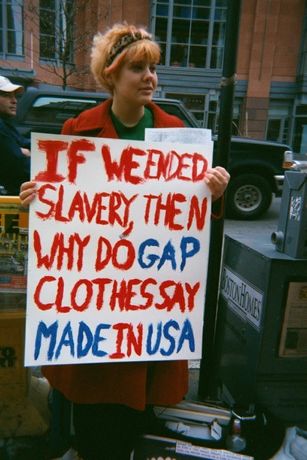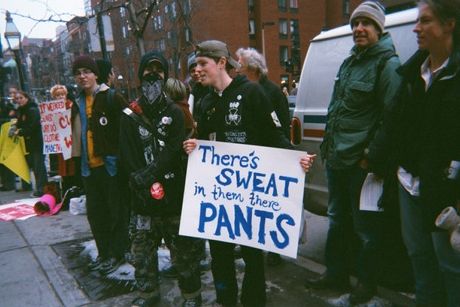 THE KIDS ARE ALL RIGHT–
THE KIDS ARE ALL RIGHT–THEY'RE FIGHTING THE CORPORATIONS
 THE KIDS ARE ALL RIGHT–
THE KIDS ARE ALL RIGHT–
THEY'RE FIGHTING THE CORPORATIONS
By John Spritzler
[newdemocracyworld.org]
The teenagers gathered in front of the GAP store, set up their sound
system during the peak of Christmas shopping, and began protesting GAP's
sweatshops. When the police took away their sound system the teens, having grown
to a crowd of one hundred or more, crossed downtown Boston's Newbury Street and
resumed their demonstration in front of NikeTown. Passing out buttons that said
"slavery"—substituting the Nike "swoosh" for the
"v"—chanting anti-sweatshop slogans, and singing anti-corporate
versions of Christmas carols, the demonstrators also listened to speeches that
told some of the facts about corporate sweatshops that are hidden from the
American public.
Virtually all of the major brand names, such as Wal-Mart, Ralph Lauren, Ann Taylor, Esprit, K-mart, Nike, Disney, GAP, etc., sell products made in sweatshops in countries like the Philippines, Vietnam, Sri Lanka and China. The wages are below subsistence—less than $6 per day in the Philippines and less than 87 cents per hour in China. Brand name corporations out-source their manufacturing to sub-contractors to deny responsibility for the slave-like conditions of work.
In Cavite, Philippines, regular shifts last from 7 a.m. to 10 p.m. A few nights a week workers have to work until 2 a.m. According to the official rules of the Philips factory (which produces for Nike and Reebok), "Refusal to render overtime work when so required" is an offense "punishable with dismissal." In China workers sometimes have to work three day shifts, and are forced to sleep under their machines. In Mexico, factories producing for Panasonic, General Electric, General Motors and Fruit of the Loom don't want to pay workers enough to raise children, so they harass pregnant women to make them quit; they require them to work the night shift or take long hours of unpaid overtime and physically strenuous tasks, and they refuse them time off for doctor visits. A Human Rights Watch study reports "[A] pregnant worker is forced to choose between having a healthy, full-term pregnancy and keeping her job."
Corporations claim that they are at least providing jobs to people who have no better alternative, that the choice is not between bad jobs and good jobs but between bad jobs or no jobs. The reality is that corporations work with local elites to make sure that people are deprived of any means of making a living other than migrating to Export Processing Zones where the local government, in the name of "economic development," gives factory owners a green light to exploit their workers to the limit. Rural workers in Cavite, Philippines, for example, told reporter Naomi Klein (author of No Logo, the source for the above facts) that "they would have stayed home if they could, but the choice was made for them: most of their families had lost their farms, displaced by golf courses, botched land-reform laws and more export processing zones."
Workers in these countries are by no means just passive victims. Their struggles, from union drives to armed revolution, are the reason why poor nations have such large military forces—to suppress popular movements.
 Teenagers in the U.S. are joining this
struggle, taking up the issue of multi-national sweatshops and fighting them
with tremendous passion. There are a number of reasons why teens especially are
drawn to this fight. Companies like GAP and Nike have targeted young people with
intense marketing campaigns, and their lies and hypocrisy are felt as almost
personal insults by teens. Also, the flip side of these foreign sweatshops is
the loss of good jobs for youngsters in the U.S., who can look forward to
low-paying temp jobs in places like Starbucks because blue-collar manufacturing
jobs that once paid a family wage have now been out-sourced to Export Processing
Zones in foreign countries.
Teenagers in the U.S. are joining this
struggle, taking up the issue of multi-national sweatshops and fighting them
with tremendous passion. There are a number of reasons why teens especially are
drawn to this fight. Companies like GAP and Nike have targeted young people with
intense marketing campaigns, and their lies and hypocrisy are felt as almost
personal insults by teens. Also, the flip side of these foreign sweatshops is
the loss of good jobs for youngsters in the U.S., who can look forward to
low-paying temp jobs in places like Starbucks because blue-collar manufacturing
jobs that once paid a family wage have now been out-sourced to Export Processing
Zones in foreign countries.
Perhaps the most important factor, however, is that teenagers today are more hopeful than older people that they can change the world. Older working people have fought major battles against the corporations and been defeated in the last few decades. Many have lost hope in their ability to change the world, especially after seeing good jobs shipped overseas and seeing their strikes sabotaged by their own union 'leaders.' Teens haven't experienced these defeats. They are demonstrating in the streets because they believe that they can win. The important thing is—they are right.
To succeed, however, the anti-sweatshop campaign needs to become more clear about two things: its goal and its view of regular Americans.
Movements never win more than they explicitly set out to win. The anti-sweatshop movement is aiming too low to really solve problems like sweatshops. One of the anti-corporate Christmas carols sung at the GAP demonstration, to the tune of "I'm Dreaming of a White Christmas," went: "I'm dreaming of a just workplace, Where every worker's organized. Where the law protects us, The boss respects us, And no jobs have been downsized." This dream falls short of what is necessary.
We need a world in which people who want to exploit others for selfish gain have no power to do so. Instead of having a "boss who respects us" we need a truly democratic society in which ordinary people are completely in charge of everything, and there are no bosses or capitalists or commissars controlling people. Our goal must be a world-wide democratic revolution that turns the world upside down. Not only is this necessary. It is possible. It is possible because it is what most people in the U.S. and the world really want.
Which leads to the question of the movement's view of regular people.
The demonstrators at the GAP seemed to be of two minds about how they viewed the Christmas shoppers on the street and Americans generally. On one hand, the demonstrators were trying to reach out to passers-by as allies in the struggle. The Christmas carol sung to the tune of "O Rest Ye Merry Gentlemen" began "O rest ye GAP executives, While young girls work so hard, To bring you 20 dollar shirts, For 60 cents an hour. The profits go to CEO's, The workers left to starve. O tidings of GAP sweatshops and lies, dangerous lies. O tidings of GAP sweatshops and lies."
The assumption of this song is that most Americans, when they know the facts, will be outraged. And this is absolutely true. Most people have values that are anti-capitalist; they believe in equality and relationships based on commitment to each other. Another Christmas carol, "Jingle Bells" ("Trickle Down"), expressed solidarity with middle class Americans with the verse (labeled "upper class chorus"): "Bells on Wall Street ring, Making my stocks rise, O what fun to be the king, Of middle class demise."
On the other hand, some of the Christmas carols reflected an opposite, negative view of ordinary people, as the cause of things like sweatshops. "Silent Night" was rendered "Violent Night" with the words: "Violent night. Superbowl night. People drink. People fight. In yon shelter is mother and child. Absent Father on a bender and wild. Weep in heavenly peace. Weep in heavenly peace."
Football fans and fathers are not the problem; they are as opposed to sweatshop slavery as anyone else. Thinking of them as the problem will only isolate the movement from most Americans, make its members feel alone, and make it powerless to change the world.
Another example of this negative view of people was the Christmas carol, "I'm Dreaming of a White (Bread) Christmas." It began "I'm dreaming of a white Christmas. Just like my childhood fantasies. Where the suburbs glisten, and the poor are missing. And everyone there lives like me. I'm dreaming of a white Christmas. Where those who sweat, they sweat for me..." The theme that people who live in the suburbs (a majority of Americans, and many of the teens who were at the demonstration) want to exploit poor people and keep them out of sight is not true and is fatal to building a democratic movement.
A negative view of regular people is the centerpiece of corporate propaganda designed to justify their atrocities. "Everybody is selfish," they say. "We're no different, and if you think society can be changed, then you're crazy."
A movement's view of people and its view of the possibilities for change are intimately related. With a more positive view of people, the anti-sweatshop movement could envision much more ambitious goals for itself and could unite with people whose concerns seem to be very different. For example, high stakes tests and market-driven health care are meant to make people feel more insecure and easier to control. No matter which of these things people are fighting, they are fighting the same corporate elite for the same reason—to make this a more democratic, equal, and mutually supportive world. The more these distinct movements point out the commonality among these issues, the stronger they will be.
If the anti-sweatshop movement gains confidence in saying that its goal is revolution to shape the world with the anti-capitalist values of equality, democracy, and solidarity; and if it spreads an understanding that these values are shared by most men and women, football fans and soccer fans, suburban, rural, and urban working people all over the world, then the movement can be unstoppable.
Originally published in New Democracy Newsletter, January-February 2001.